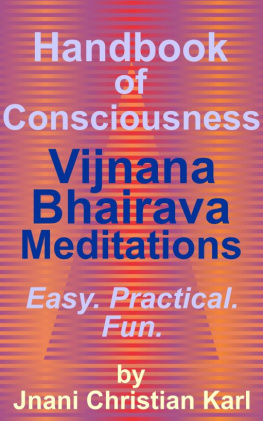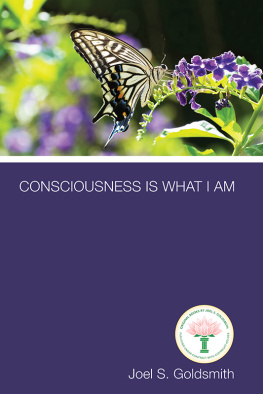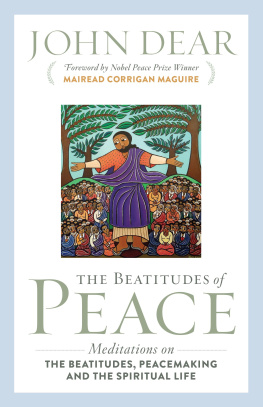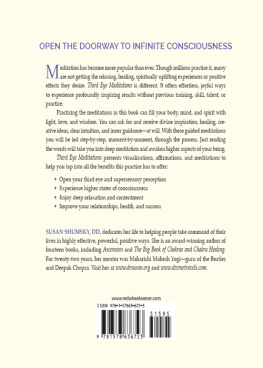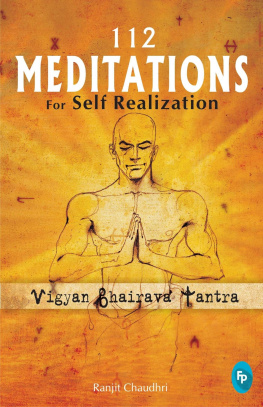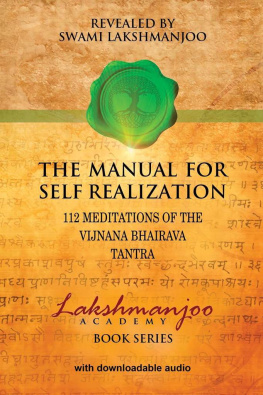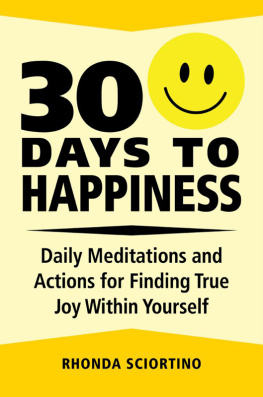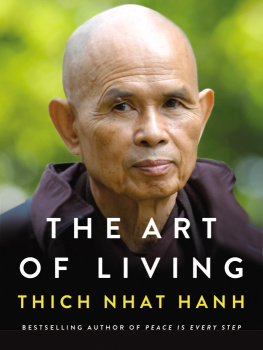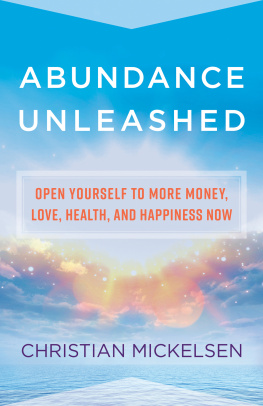Christian Karl - Handbook of Consciousness
Here you can read online Christian Karl - Handbook of Consciousness full text of the book (entire story) in english for free. Download pdf and epub, get meaning, cover and reviews about this ebook. publisher: Christian Karl, genre: Religion. Description of the work, (preface) as well as reviews are available. Best literature library LitArk.com created for fans of good reading and offers a wide selection of genres:
Romance novel
Science fiction
Adventure
Detective
Science
History
Home and family
Prose
Art
Politics
Computer
Non-fiction
Religion
Business
Children
Humor
Choose a favorite category and find really read worthwhile books. Enjoy immersion in the world of imagination, feel the emotions of the characters or learn something new for yourself, make an fascinating discovery.
- Book:Handbook of Consciousness
- Author:
- Publisher:Christian Karl
- Genre:
- Rating:4 / 5
- Favourites:Add to favourites
- Your mark:
- 80
- 1
- 2
- 3
- 4
- 5
Handbook of Consciousness: summary, description and annotation
We offer to read an annotation, description, summary or preface (depends on what the author of the book "Handbook of Consciousness" wrote himself). If you haven't found the necessary information about the book — write in the comments, we will try to find it.
Handbook of Consciousness — read online for free the complete book (whole text) full work
Below is the text of the book, divided by pages. System saving the place of the last page read, allows you to conveniently read the book "Handbook of Consciousness" online for free, without having to search again every time where you left off. Put a bookmark, and you can go to the page where you finished reading at any time.
Font size:
Interval:
Bookmark:
Handbook OfConsciousness
Vijnana BharaivaMeditations
For Everyday Use
Easy. Practical.Fun.
By Jnani ChristianKarl
Copyright 2014 byChristian Karl
All RightsReserved
To all who love toexperience the bliss of meditation.
Contents
Foreword
The Vijana Bhairava Tantra is awonderful spiritual book containing over one hundred stanzasdescribing various meditation techniques. These techniques aredesigned to allow the interested spiritual seeker to experience thetruth about the highest Self for himself/herself.
Some of the techniques are repetitionsand others are not very practical in today's age. Therefore, inthis book, "Handbook of Consciousness,' I have selected aroundseventy of those techniques that are unique and that can bepracticed easily in today's world with great results.
I want everyone in this world to havethe direct experience of the conscious Self; because that is thehighest experience we as humans are capable of. We often get lostin our search for fulfillment and end up chasing tastelesscardboard. The bliss that is contained in the experience of theconscious Self is sweet like honey. It is enticing. It iscaptivating our hearts and minds forever. Therefore, we should havetools at our disposal that help us bring this bliss into our dailylives.
These meditations will do just that.Practice one or practice all of them. You will get the blissfulexperience of the conscious Self.
The highest knowledge of the Self isonly truly attained when you experience it for yourself.
Part O ne: TheMeditations
1. Meditate on the stillspace between the in-breath and the out-breath.
When you pay close attention to yourbreath, you can see that it swings back and forth between two stillmoments.
There is a still moment when thebreath stops after the in-breath, and there is another still momentafter the out-breath stops. Your thoughts and your breath areclosed correlated. When your breath slows down, so do yourthoughts, and vice versa.
Without straining, focus yourattention on these still moments that naturally arise. Simplylisten to them, be gently aware of them. See that your breathmerges into nothingness, and that it arises out ofnothingness.
When your breath ends, you will findyourself in a state of nothingness. But this is not an emptynothingness. In fact, this nothingness is full of knowing, full ofawareness, full of your being.
Listen to this nothingness, restcomfortably in it and realize your innate perfection as a consciousbeing.
2. Focus your attentionbetween the eyebrows.
Concentrate, without strain, on thespace between the eyebrows. Some people concentrate on the tip ofthe nose. When you concentrate like this, all your attention isdirected toward one point in a stream-like fashion.
Other thoughts are gently pushed asideand mind energy flows only in one direction, toward the center.This is similar to a focusing lens, where light energy isconcentrated in one point. This focusing brings about a naturalstilling of the mind energy.
In the center point, there is no moreexperience of duality, there is only oneness. The experiencer andthe experience have merged in the experienced.
This state of non-duality cannot beadequately described. It can only be experienced. When thisexperience happens, duality vanishes together with your sense of aseparate self. You will find yourself in the pure and blissfulstate of the I am.
3. Look at a blank wall orother blank surface.
Looking at a blank surface evokes afeeling of expanse. There is nothing to hold on to for your mindanymore and as a result, you feel free from limitations. In thisfreedom you are open to all possibilities.
After a while of experiencing thisfreedom some fear may begin to creep into your mind. Fear caused bya feeling that you are about to lose your sense of identity. Inthis emptiness, where your mind also becomes empty, there is verylittle substance for your ego-sense to find any validation. As aresult, you may begin to feel lost.
You may ask, Why am I doing this?What is the point in this? I want to get back to something I amfamiliar with.
In the familiar is not where you canfind freedom from the already established mind. My teacher saidthat a person with mind wants everything. A person without minddesires nothing.
When looking at a blank surface, yourmind becomes quiet and still. Only in this stillness can you betruly content, truly alert, truly blissful, and truly inside yourown sense of being.
4. Meditate onall-encompassing space.
Space is all around you, but most of the timeyou probably do not pay much attention to it. Usually you are onlyaware of the objects that fill this space, such as houses, cars,people, chairs, and even your own body.
Begin this meditation with your nearestsurroundings, with the things that are close to you. Look aroundyou and realize that all objects are simply floating in space. Inthis way, they begin to lose their heaviness and appear to becomeas light as a feather.
Meditate on this lightness, this sense ofexpansiveness. Be as light as a feather, floating in or movingthrough eternal space.
Sense the space that surrounds theearth, and sense the earth floating in this all-encompassing space.You can go even further and sense the infinite space of theuniverse in which infinite galaxies are floating.
Make certain that you do not excludeyourself from this universe. Your body is one of the objects thatare surrounded outside and are penetrated inside by allencompassing space. Your body is like an empty pitcher that isfilled with space and is surrounded on all sides by the same space,as well.
5. Meditate onall-encompassing emptiness.
There is a wonderful expression inBuddhism, The realization of the emptiness of inherent existence.This is the highest realization in a particular school ofBuddhism.
When you keep asking the question Whoam I? you will, eventually, be brought to a place ofall-encompassing emptiness.
It is not that your life is empty andhas no meaning, but that a separate you does not exist. Thisnon-existence is the same as emptiness. You may begin by asking,Who am I? but you may end up asking, Where am I? because youwill completely lose track of yourself.
You will lose yourself in the vastnessof existence itself. Questions of God, the world, and Self willbecome so completely irrelevant to your sense of being that youwonder what you found important in them before.
In this complete nothingness, thereyou will find the deepest wonder of it all: a sense of existing, ofbeing, of pure knowing. This is the conscious experience. In thisconscious experience there is no room for another, no room forobjects, no room for thoughts and feelings. All you find here istimeless bliss.
6. Close all openings ofyour head (7) and meditate on stillness.
Since this closing of all openings ofthe head can only be done for a very short timefor as long as youcan hold your breath inside or keep the breath outsidethisMeditation technique should be taken in the sense that youenergetically close yourself off from your sense organs.
The technique, therefore, is tomeditate on stillness. Stillness surrounds you at all times and allplaces. It is because of this underlying stillness that youperceive the sounds that are superimposed upon it.
In the same way, as waves depend onthe depth of the ocean for their existence, so sounds depend onstillness for their existence.
Meditate on the stillness that isunderlying all sounds. Begin with perceiving the stillness betweentwo sounds, and then find it underneath the sound itself. Thisstillness is nothing other than awareness. Awareness is alwaysstill. Awareness is the silent perceiver. This perceiver is thebase from which all is measured.
This Awareness is the witness behindit all.
Next pageFont size:
Interval:
Bookmark:
Similar books «Handbook of Consciousness»
Look at similar books to Handbook of Consciousness. We have selected literature similar in name and meaning in the hope of providing readers with more options to find new, interesting, not yet read works.
Discussion, reviews of the book Handbook of Consciousness and just readers' own opinions. Leave your comments, write what you think about the work, its meaning or the main characters. Specify what exactly you liked and what you didn't like, and why you think so.

